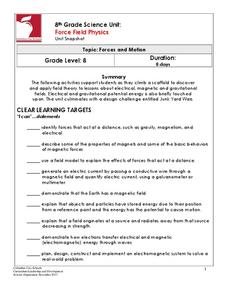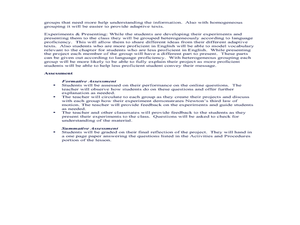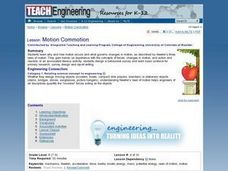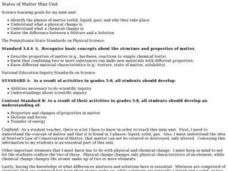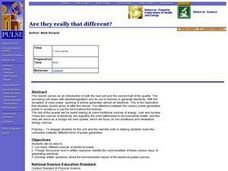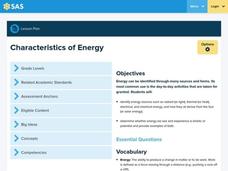Columbus City Schools
Force Field Physics
Attracted class members to an activity-packed journey through the science behind the invisible forces at work all around us. From jump rope generators to junkyard wars, there's never a dull moment when eighth grade physics scholars...
Curated OER
Motion in the Ocean
How does the formation of currents and waves in the ocean happen? High schoolers will learn about the primary causes for ocean currents and waves by calculating a wave's amplitude and nautical mile speed. Then they will complete a...
Curated OER
Isaac Newton's Third Law of Motion
Ninth graders experiment with Isaac Newton's Third Law of Motion. In this Third Law of Motion lesson, 9th graders develop an experiment that shows their understanding of this theorem. They work in small groups to read an article at a...
Curated OER
Forces and Motion
Fifth graders participate in a series of hands-on, Web-based activities and video-based activities to extend their learning of Forces and Motion.
Curated OER
Angular Momentum (Automaticity)
Second graders experience practicing with a wide variety of vocabulary terms that relate to the Vista/Module "Angular Momentum:" momentum, inertia, force; motion, direction, centripetal force; angular momentum, gyroscope, resist. They...
Curated OER
Let's Get Moving
Students participate in sports activities that relate to motion, velocity and momentum. They produce a PowerPoint presentation after researching the activities.
Curated OER
Keep In Touch: Communications and Satellites
Fourth graders explore communications by reading assigned space science text. In this satellite lesson, 4th graders identify the concept of orbiting and examine gravitational pull by viewing diagrams. Students are assessed based on...
Curated OER
Science: Motion Commotion
Students examine Newton's three laws of motion to discover what causes it and how it changes. They conduct motion experiments by building catapults and constructing balloon rockets. Finally, they conduct peer studies correlating...
Curated OER
Motion Through the Ages
Eighth graders conduct internet research to produce a timeline of man's growth in understanding of concepts of motion and planetary motion through history.
Curated OER
Force/Newton's Laws/Friction
Students describe how to recognize a force, define balanced and net forces, state Newton's first law of motion, explain why friction works, state Newton's second Law of Motion, and explain why the direction of force is important.
Curated OER
What Structural Challenges Do Bridge Builders Face Today?
Students investigate the process of constructing a bridge. They study the meaning of structural force and draw pictures of examples. Students identify the types of building materials have been used in history to construct bridges and how...
Curated OER
States of Matter Mini-Unit
Students identify he phases of matter (solid, liquid, gas), and why they take place. They comprehend what a physical change is and what a chemical change is. Students know the difference between a Mixture and a Solution.
Columbus City Schools
Totally Tides
Surf's up, big kahunas! How do surfers know when the big waves will appear? They use science! Over the course of five days, dive in to the inner workings of tidal waves and learn to predict sea levels with the moon as your guide.
Teach Engineering
You Are There... First Flight
Glide into the study of flight. An engaging lesson has scholars research information on the Wright brothers. They develop props and produce a recreation of the first flight at Kitty Hawk. They then report on the event as if they were...
Curated OER
Kites: Patang - The Indian Fighter Kite
Young scholars investigate the history of fighter kites and build their own. In this aeronautics lesson plan, students discover how other countries utilize fighter kites and where they originated. Young scholars create their...
Curated OER
Astronomy
Students complete a unit of lessons on our solar system, its stars, and astronomers. They record information in a space journal, design constellations, define key vocabulary, observe the phases of the moon, and create a group planet...
Curated OER
D-Day Message from General Eisenhower to General Marshall
Students use documents in the National Archives of the United States to evaluate the effectiveness of D-Day.
Curated OER
The Physics of the Planets: How 16th and 17th Century Physicist Helped Us Understand Our Solar System
Eighth graders draw the paths of the planets in the solar system. In this astronomy lesson, 8th graders calculate speed of objects using distance and time information. They research about the work of scientists in the 16th and 17th century.
Curated OER
Science: Generating Electricity
Eighth graders examine the various methods of generating electricity and explain their commonalities. They determine what is the most common source of energy and what are the potential environmental health hazards due to electrical...
Curated OER
Sciences Working Together
Pupils research articles about science technology and society. In this science and technology lesson, students answer questions about an article they chose. They share what they learned with their peers.
Curated OER
3RC (Reduce, Reuse, Recycle and Compost)
Students examine the effects of packaging decisions and the engineering advancements in packaging materials and waste management. They observe biodegradation in a model landfill.
Curated OER
Characteristics of Energy
Fourth graders view a video and create a KWL to identify energy sources. In this energy sources lesson plan, 4th graders explore the meaning of energy, kinetic energy, potential energy, thermal energy, radiant energy, and electrical...
Curated OER
Sound Waves
Students explore sound. For this "sound" science lesson, students define sound and explain how sound travels. Students experiment with paper cups and string to conclude how sound travels. Students research a chosen aspect of sound with a...
Curated OER
Weather, Climate and Atmospheric Process
Students explore Earth science by completing a could identification activity. In this weather lesson, students discuss the different forms of measurement for the weather of Earth. Students discuss global warming and examine a list of...
